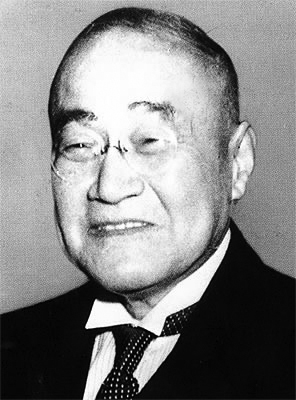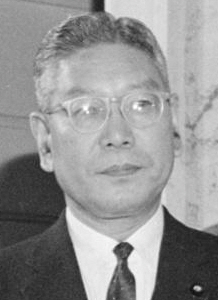<Back to Index>
- 45th Prime Minister of Japan Shigeru Yoshida, 1878
- 58th Prime Minister of Japan Hayato Ikeda, 1899
PAGE SPONSOR

Shigeru Yoshida (吉田 茂 Yoshida Shigeru) (September 22, 1878 – October 20, 1967) was a Japanese diplomat and politician who served as Prime Minister of Japan from 1946 to 1947 and from 1948 to 1954.
Yoshida was born in Yokosuka near Tokyo and educated at Tokyo Imperial University. He entered Japan's diplomatic corps in 1906 just after Japan's victory against Russia in the Russo - Japanese War. He was Japan's ambassador to Italy and the United Kingdom during the 1930s and finally retired from his last appointment as ambassador to London in 1938. Throughout the 1930s and before the war ended in the 1940s, Yoshida continued to participate in Japan's imperialist movement. After several months' imprisonment in 1945, he became one of Japan's key postwar leaders.
Yoshida became the 45th prime minister on May 22, 1946. His pro - American and pro - British ideals and his knowledge of Western societies, gained through education and political work abroad are what made him the perfect candidate in the eyes of the postwar Allied occupation. He is de facto the last prime minister of the Empire of Japan, before it was abolished following the signing of the constitution.
After being replaced with Tetsu Katayama on May 24, 1947, he returned to the post as the 48th prime minister on October 15, 1948.
Yoshida's policies, emphasizing Japan's economic recovery and a reliance on United States military protection at the expense of independence in foreign affairs, became known as the Yoshida Doctrine and shaped Japanese foreign policy during the Cold War era and beyond.
Under Yoshida's leadership, Japan began to rebuild its lost industrial infrastructure and placed a premium on unrestrained economic growth. Many of these concepts still impact Japan's political and economic policies. However, since the 1970s environmental movement, the bursting of Japan's economic bubble, and the end of the Cold War, Japan has been struggling to redefine its national goals. His administration openly encouraged a "3-S" policy — sports, screen and sex, a change from the strict pre - war censorship of materials labeled obscene or immoral.
He was retained in three succeeding elections (49th: February 16, 1949; 50th: October 30, 1952; and 51st: May 21, 1953). Power slipped away as he was ousted on December 10, 1954, when he was replaced by Ichirō Hatoyama.
Yoshida retired from the Diet of Japan in 1963.
In 1967, Yoshida was baptized on his deathbed after hiding his Catholicism throughout most of his life. His funeral was held in St. Mary's Cathedral, Tokyo.
Yoshida's grandchildren are Princess Tomohito of Mikasa and Tarō Asō, a Japanese politician who served as the 92nd Prime Minister of Japan from 2008 to 2009.

Hayato Ikeda (池田 勇人 Ikeda Hayato, December 3, 1899 – August 13, 1965) born in Takehara, Hiroshima, was a Japanese politician and the 58th, 59th and 60th Prime Minister of Japan from July 19, 1960 to November 9, 1964.
As Prime Minister, he advocated the "income - doubling plan" and "politics of patience and reconciliation," respectively emphasizing economic development of Japan while minimizing societal conflict. He was noted for resolution of several major labor disputes, including a long running strike at Miike Mine of Mitsui Mining Company (the resolution of this strike was in fact the first act of the Ikeda cabinet).
Takafusa Nakamura, a leading economic historian, described Ikeda as "the single most important figure in Japan's rapid growth. He should long be remembered as the man who pulled together a national consensus for economic growth." His plan predicted a 7.2 percent growth rate (thereby doubling GNP over ten years), but by the second half of the 1960s, average growth had climbed to an astounding 11.6 percent. In addition, while Ikeda's "income - doubling plan" called for average personal incomes to double with ten years, this was actually achieved within seven years. In 1960, French president Charles De Gaulle famously referred to Ikeda as "that transistor salesman".
Along with Eisaku Satō, Ikeda was an understudy of Shigeru Yoshida earlier in life, and was called an "honor student" for his commitment to the ideas presented in the Yoshida Doctrine, although he had a strong personality himself. His 1952 resignation as Minister of International Trade and Industry was the result of a blunt remark in the Diet that "it makes no difference to me if five or ten small businessmen are forced to commit suicide," after Ikeda's policies favoring heavy industry were imposed.